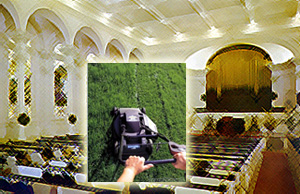Page 1 Page 2 Page 3 Page 4 Page 5

Air currents in our house that summer shifted from mild to anxious, not because of disputes between my parents, but because of differences of opinion between my mother and me and because of change in the Outerbridges’ lives. One evening around ten o’clock when I listened to the Phillies-Cubs ball game, my bedroom door cracked open a couple inches. I heard my parents come up the stairs. Their conversation blurred until my mother said, “Betty could spit nails. To think that Ed could sit there in church… Susan is heartbroken, poor kid.”
I opened my door. “What happened?” I asked.
They explained. Betty Outerbridge had “thrown Ed” out of the house. He was now living with another woman, Jacqueline Stiles, the same woman he had sat with in church.
I closed my bedroom door. Little Susan Outerbridge, I thought. “Hi David,” she had greeted me Sunday mornings, wearing stupid little girl dresses and stupid little girl white socks and black shoes. I had turned away from her. Now I felt like a coward for not acknowledging her.
“There’s always two sides to a situation like this,” I overheard my father say to my mother.
“But he has no right humiliating his family,” she replied. “It’s sad. Two daughters, both with absent fathers now.”
On a Sunday in mid July I was crucifer again for 11 a.m. Morning Prayer. As I led the Senior Choir’s processional hymn of “I Sing a Song of the Saints of God” up the center aisle, I glanced toward the middle pews on the Gospel side of the congregation. Ed Outerbridge and Jacqueline Stiles stood together, her arm draped around the shoulders of her daughter, and shared a hymnal. The little girl’s brown hair fell in ringlets over the white collar of her dress.
As I passed the pew where they sat, Ed skirted a look in my direction. Without pausing in singing, he bowed and nodded toward the Cross.
During the service I sat in my usual place, the choir stall beside Betty. I could see most of the congregation on the Gospel side, including Ed Outerbridge and Jacqueline Stiles, who sat together, their arms touching, two rows in front of my parents. During the sermon, the little girl whispered to her mother. Jacqueline Stiles held her index finger to her mouth. She then took the little girl by the hand and walked her out of the pew and up the side aisle and through the inside doors to the parish hall. They returned a few minutes later.
My parents watched them leave and return as their heels tamped the hardwood floor. Some people looked toward me, but I knew I was not the subject of their interest.
I wondered: How often during the service did Betty Outerbridge look at faces reflected in the mirror?
What was it like for a man to leave his home? Would he still talk to his friends, his wife? His daughter? Were their friends still his friends?
As summer continued, my mother occasionally met Betty Outerbridge for lunch. I did not know if my father had talked with Ed about “the situation,” as my parents referred to the Outerbridge separation and its repercussions. My parents’ days at work, their plans to spend a week in Cape May in August, my chores done and undone highlighted dinner table conversation. Except extended silences, the summer was like any other.
As we cleared the table after dinner one evening, my mother suggested she and my father meet Betty and Professor and Mrs. Wilson for dinner soon. “Some place out of town, where Betty doesn’t have to worry about someone seeing her and talking about her. I’ve already cleared it with her and the Wilsons ,” my mother said. Dad agreed. “Want to join us?” she asked me.
“No…” Then: “How’s Susan doing?”
My mother stopped running water in the sink. She turned to me and said, “Betty says she’s doing okay. She’s torn, poor kid. She loves her dad but hates him for what he’s doing — living with someone else, making a darn fool of himself, if you ask me.” She paused and then said, “That’s nice of you to think about Susan.”
I pushed in my chair.
“Are you sure you don’t want to come with us for dinner?” my father asked.
“Yeah, I’m sure,” I said. I was not interested in watching TV that night. Maybe I would listen to the Phillies–Pirates. Maybe I’d call Joey and Wayne and ask if they wanted to meet me at a new miniature golf course that had opened near Halcyon Lake . Before I went up to my room I asked my mother and father, “You two are all right, aren’t you?”
They looked at each other and, surprised, smiled as if they had suddenly become aware of an unknown. “We’re fine,” Dad said. At night they kept their bedroom door closed. Their voices behind the door were like shadows that appeared then vanished beyond windows.
What would Ed Outerbridge do if he met me on the street? I wondered. What would he say to me?
My answer came the next time I mowed the lawn at Holy Trinity.

